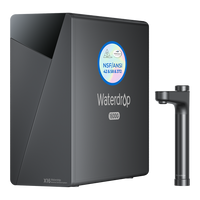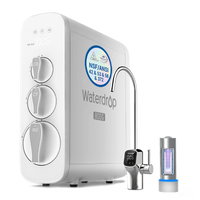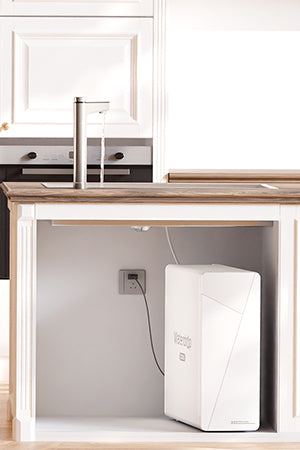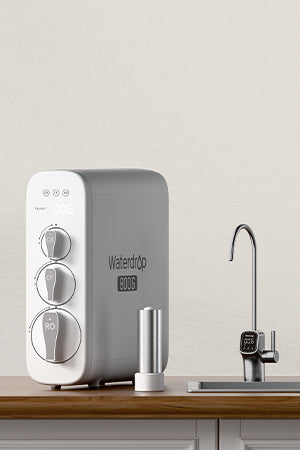Calgary, Alberta, has a reputation for having a good, well-maintained water supply. With growing environmental issues and news of contaminants in Canadian drinking water, many Canadians are still asking themselves — is Calgary tap water really safe to drink?
This guide delves into Calgary’s water supply, quality, possible dangers, and how you can make your drinking water healthy and pure.
Where Does Calgary Tap Water Actually Come From?
Calgary’s water for drinking comes mainly from two rivers —
the Bow River and
the Elbow River . Their origins are from the eastern slopes of the Rocky Mountains, which give pretty clean, fresh water.
Before it reaches your faucet, the water passes through a costly treatment process at Calgary’s primary water treatment plants, Glenmore and Bearspaw. It’s there that water gets treated and cleansed to Canadian Drinking Water Guidelines standards.
The procedure normally involves:
- Coagulation and sedimentation: Destroys suspended particles.
- Filtration: Removes minute impurities such as silt and microorganisms.
- Disinfection: Chlorine and UV are employed to dispatch viruses, and other pathogens.
Following treatment, the water is leveled in tanks and supplied to buildings and households throughout the town via sewer pipes.
Calgary Tap Water: Good or Bad to Drink?
Yes, as a general rule, Calgary tap water is safe to consume. According to City of Calgary, the water complies or exceeds provincial and
federal drinking water standards .
Systematic testing makes certain that levels of contaminants as those of lead, chlorine, bacteria, and nitrates are far under the safety levels designated by Health Canada.
With a few exceptions, Calgary tap water is just fine to drink directly from the tap. Though, there are still a number of issues that may impact the safety and quality of the water once it gets to you.
What Might Influence Tap Water Quality in Calgary Residences?
Although Calgary gives good water, certain household considerations can affect its safety or taste.
1. Aging Plumbing Systems
If you have a house that was built prior to the 1960s, there could still be
lead pipes or lead fixture present in your plumbing. Leaching can happen to the water if it stays in lead pipes for hours. Even moderate exposure to lead has the potential to be harmful, especially to pregnant women and children.
2. Pipe Corrosion
Houses that have copper or galvanized steel pipes can also suffer from corrosion in the long run. It can bring along the traces of metals, such as iron or copper, which can lead to discoloration and a bad metallic flavor.
3. Chlorine Taste or Odor
Though we add chlorine to disinfect, it stinks a little and tastes bad to some individuals. This is not an indicator that it’s unsafe — but it does make it less tasty to ingest.
4. Hardness
Calgary water is represented as moderately hard, thus containing calcium and magnesium minerals. Hard water does not have any harmful effects on health, but it tends to build up in appliances and makes the soap less efficient.
How Does Calgary Provide Water Safety?
Calgary has among the best water treatment plants in Canada. The municipal authority carries out real-time monitoring of water quality, undertaking more than 150,000 water tests annually.
Testing is done throughout each stage — from the rivers of origin to the treatment plants and for the complete distribution system. Parameters tracked are:
- Bacteria
- Acid-base characterization
- Turbidity
- Chlorine level
- Heavy metals
- Organic Compounds
Calgary also issues yearly water quality reports to stay accountable to citizens. Those reports invariably indicate that Calgary’s water exceeds or conforms to national standards.
Why Does Calgary Tap Water Sometimes Taste Different?
Several Calgary residents have observed that the taste of tap water may differ slightly throughout the year. This is a result of:
- Annual variations in the river water: Snowmelt or rain influences the level of minerals.
- Temperature fluctuations: Cold water tends to be sweeter than hot water.
- Distribution distance: Water traveling further in pipes could acquire a circular or earthy taste.
If you experience a shift in flavor, pouring your tap for a few seconds may help clear standing water out of your pipes.
Is Bottled Water Healthier Than Calgary Tap Water?
Not really. Bottled water isn’t necessarily safer than tap water.
Microplastics contamination is a big concern for all. Actually, Calgary water is tested more strictly than the majority of brands of bottled water. Furthermore, bottled water uses plastic and costs a bit more in the long run.
If you like a purer flavor or a little extra confidence, a home water filtration system makes a more environmentally-friendly and financially-smart choice.
Should You Use a Water Filter in Calgary?
Although Calgary water from the tap is safe, a number of residents opt to fit a water filter due to the following reasons:
- Better flavor: Filters may avoid or remove unwanted tastes.
- Additional protection: They can lower lead, sediments, and possible contaminants.
- Health gain: Easier water could make you drink more water.
- Environmental impact: Filters also cut down the use of single-use plastic bottles.
One of the best options for Calgary home owners is the
Waterdrop Reverse Osmosis (RO) system :
- Advanced multi-stage filtration: Eliminates an average of 99% of typical contaminants, including lead, chlorine, and fluorine.
- Compact and quick installation: Convenient for houses and apartments.
- Saves water efficiently: Waterdrop RO systems are efficient and have minimal wastage.
Whether you worry about outdated pipes or just want water that tastes as pure as possible, a Waterdrop filter will bring you peace of mind and comfort.
How to Check Your Home’s Water Quality?
If you’re unsure about your household’s water condition, you can:
- Ask a certified laboratory to provide you a water test kit.
- Speak to Calgary’s Water Services to inquire about water sampling in your neighborhood.
- Check for signals of problems, like discolor, strange flavor, or low pressure.
Checking your tap water every few years — particularly in older houses — assists in preventing continued danger.
People Also Ask
Can pets drink Calgary tap water?
Calgary tap water is safe to give to your pets. If you have sensitive or special medical issues, you may still want to give out the filtered water.
Is Calgary water being fluoridated?
No.
Calgary ended water fluoridation in 2011 when the city council voted against it. Although some call for it to be re-established to avoid tooth decay, others opt for fluoride-free water.
Can you drink Calgary hotel tap water?
Yes, Calgary hotel water is treated and safe to drink. If you want water that tastes neutral, you may want to use a portable water filter water bottle.
Is boiling Calgary tap water necessary?
No, not in the regular course. Boiling is advised in a Boil Water Advisory situation, which does not happen often in Calgary.
Is Calgary tap water hard?
Calgary water hardness lies between 120–180 mg/L, which falls under moderately hard. It may not be harmful but has the tendency to cause deposits of minerals on fixture.
Last Considerations
In summary — Calgary water from the tap is pure to drink, sanitary, and properly regulated by city officials. Nonetheless, issues such as old pipes, or the presence of minerals may impact your water once it gets to your spout.
For individuals who demand the cleanest and purest-tasting water, a Waterdrop filtration system is a good investment that offers a good kind of security and a better drinking experience. Clean water aids to health, and in the case of Calgary, you'll have confidence — filter or no filter — that your water has the highest safety standards.











































































